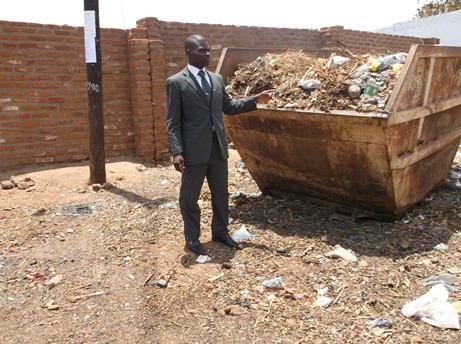
March 2015—Local government representatives in Malawi are being held accountable for their performance and, since their election last year, things are looking up, at least according to reports from one ward.
Councilor Maloni Chatewa of Mbvunguti ward in the capital of Lilongwe beams with pride as he shows some of the projects he has initiated since his election in May 2014. He gestures to a huge garbage bin in the nearby market. “This whole area was heaped with garbage and posed a big health risk to market users and community members living nearby,” he says, “but as you can see, it is now clean and well taken care of … the city workers come regularly to clean this place and take away the garbage.”
Chatewa also points out the new public toilets constructed nearby. “Poor hygiene will no longer be an issue at the market. The old toilets were unsafe and presented a big health hazard to the entire community,” he says.
Chatewa credits his good start as a local councilor to USAID’s civic and voter education project. “The project has helped me to form strong relationships with the community leaders as well as our member of Parliament,” he says. “Together, we agreed on priorities for this ward and started taking action on those.” Improved sanitation was one of those priorities.
As part of the civic voter education project, Chatewa and other candidates participated in pre-election debates and signed a social contract with community leaders of his ward shortly before the election. The contract outlined priorities that he would focus on if elected.
“The candidate debates provided me an opportunity to reach a wider community than I would just with my campaign efforts; and the signing of the social contract helped me not only to align my priorities with those of the community, but also to feel that I am bound to fulfill my campaign promises,” said Chatewa.
Community members in Mbvunguti ward are happy with their new relationship with local government. Isaac Benson Scale, who heads a community-based organization called Youth and Civic Education, concurs, “For the first time, the youth are being considered in all development initiatives taking place in this area. I am particularly happy because we have developed a good relationship with our local councilor and our representatives in Parliament and are able to meet them regularly to follow up on issues that matter to us.”
“I know exactly what to expect from both the Parliament and my local councilor based on the agreements in the social contract and I have a good basis for follow up,” said Henry Mpanje, one of the 15 block leaders within Mbvunguti. “I also like the fact that the project has brought unity between our members of Parliament and our councilor even though they do not belong to the same political party. They always discuss and agree on what needs to be done. This is good for us.”
While it works with all citizens, the civic and voter education project focuses on youth as a marginalized group, prioritizing persons with disabilities and young women. So far, the project has reached more than 1,500 people directly and 30,000 people indirectly in Malawi's capital, Lilongwe, and the project is currently expanding to all constituents in the Lilongwe rural district.
The USAID civic and voter education project gave citizens a chance to advocate for accountability among elected officials following the May 2014 tripartite elections when the country elected a president, members of Parliament, and local councilors. The project, which began in February 2014, is implemented by the Malawi Human Rights Youth Network and the Young Politicians Union. The voter education aspect of the project ended in May 2014 with the elections, while the civic education component will continue through December 2015.
LINKS
Follow @usaidafrica, on Facebook







Comment
Make a general inquiry or suggest an improvement.